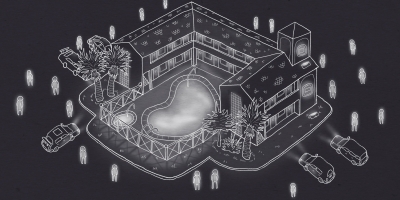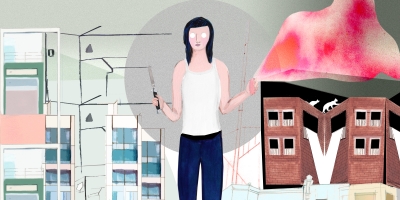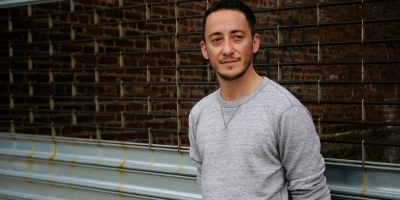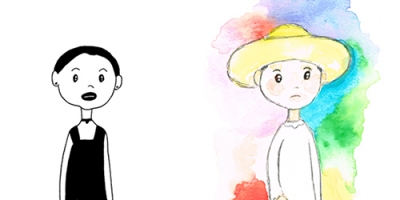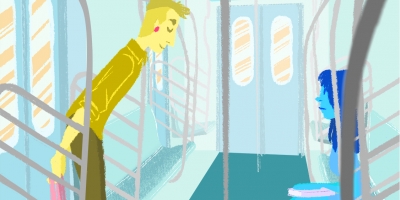Fiction
Airport Hotel Ghost Tour
by Tobias Carroll

And on certain days, you understood fully where you were at a particular moment. Not here, thought Marco Hodge, and not now. Sometimes he thought of holy places, and sometimes he thought of places that had become sanctified to him over the years. Here, he could only think of ritual and hastily chosen responsibility. On this trip, he had sat in venerable restaurants and watched neighborhoods from the window of a subdued streetcar, the breeze made by motion lending dimension to an idly watched sleeve. In this city, he had briefly found respite from the mourning to come. Now he sat below neon lights. A plate of food, formerly frozen, then flash-fried, faced him. He was one of three patrons, the one seated nearest the entrance, given full view of a room that extended far longer than he would have imagined. Piped in through the speakers above came music, an intellectual’s swing. Marco pegged it as something from Donald Fagen’s The Nightfly. Then he reached down and found a morsel of chicken, weighed it in his hand, and began consumption.
Marco was sitting in the restaurant of his airport hotel. The restaurant of his airport hotel was a Denny’s, and the airport hotel was in New Orleans, and on some level, this fact coldly mocked him. He would have ordered a beer if they had served beer at this airport hotel Denny’s, but if you wanted a beer you had to exit the Denny’s and enter some sort of chain bar through a door adjoining the exit. The walls facing the restaurant were glass, and a logo sat sterile on the other side. The bar, as far as Marco could tell, held fifteen at most. Marco wondered if this chain bar had regulars. If there were, none were there on this particular night. The bartender was reading something stark and avant-garde. Marco assumed the place was still open. He wondered if their beer selection was actually stunning, if this was some undiscovered gem, if, one day, that bar would be full to capacity, the handiwork of an ambitious beer buyer finally blossoming into relative success.
Marco had worked in restaurants once. It wasn’t a world to which he much wanted to return. The same could be said for nearly all his past occupations. It was now nine—ten hours until the time printed on his boarding pass, and the quarter-hour airport shuttle had to be boarded ninety minutes beforehand. His time in the city dwindled. The plate of chicken fingers before him was now reduced to crumbs and the remains of dipping sauce. The Donald Fagen album continued on its way. Marco withdrew his wallet, set twelve dollars on the table, and walked to the front door. The glass-walled chain bar got a second look as he went; still deserted save the bartender. He wondered what might transpire if he walked in. Whole futures passed in that moment, infinite and minute Marco Hodges ebbing away.
He could have struck up a friendship or a romance with the bartender; they could have become mortal enemies or secret allies. Possible friends and possible children and possible homes ceased in the blink of an eye. Instead, he met Otto Artur, and that was how he came to take the pilgrim’s walk.
At the end of the row of doors that terminated at a soda machine was a set of stairs leading up. The man stood there, dressed in a bespoke suit. He wore glasses with something cylindrical strapped to each side; after a while, Marco realized that these were penlights, their lights long since burnt out. He cleared his throat as Marco approached.
“You’re here for the tour?” the man said.
This was the start of something, Marco thought. This was probably not the start of something good. This was an invitation he knew he would accept.
“What’s the tour?” Marco answered.
“Ghost tour,” said the man. Marco nodded. “It’s ten dollars a ticket. My name’s Otto. Welcome.” Marco handed over two fives, and it began.
The hotel hung low-slung like a truncated letter U. There was a long stretch with two abbreviated wings facing out over an emptied pool, around which yellow caution tape had been half-assedly strung. To Marco, it seemed less a warning than someone’s beshat detritus, or a celebration’s weather-worn aftermath. From the second floor, it seemed like a giant’s grave, waiting to be filled.
The hotel’s outline reminded Marco of a kind of fortress, designed to obscure the adjacent takeoffs and landings. It seemed to Marco that this had been a failure. Though the planes’ ascent and descent was cloaked, their sound was not; removed from the accompanying visuals, there was only that sort of terror, the sound of nearby engines and metal, hurtling or falling less than a mile away. The sounds and sensations that this shelter released could only summon sharp anxiety and catastrophe’s illusion. Who needed ghosts, Marco thought. He continued up the stairs, following Otto.
This was his first ghost tour. He had seen signs for them before, on trips varied in their purpose: sometimes vacation, sometimes work, sometimes obligation. In one Scandinavian city, he’d seen English-language flyers posted in coffee shops; later in the day, he saw a lonesome man prowling the square cited on those flyers as the meeting point. He’d stood at the opposite end and watched the man waiting, had tried hard not to betray any interest. Eventually, Marco left. Days and weeks and months later, he found himself wondering whether the tour guide had found takers. Where does a lonesome ghost tour guide go when he’s alone? Does he go sit with his charges in haunted structures and wait, a glass of wine in his hand, facing spectral faces? Marco knew that this was sentiment, sentiment he’d pledged to avoid, but still the reservations poked at him.
All those he’d lost, and still: regrets that he hadn’t slapped kronor into the hand of some lonesome man on an August night. Strange.
He had come to think of ghost tour purveyors as a kind of ghost themselves. They haunted, they circulated. The way dogs and their owners came to resemble one another, he thought. He’d been staring out into some ice-strewn sea when an image came to him of ghost tours spotlighting the restless souls of ghost tour guides, who in turn brought ghosts on their own tours of ghosts of an older generation. He thought of that spiral, of that chase, of those circles of failed pursuits. On that afternoon, he had been ten miles from Nuuk, had been leading one group to handle a transaction with another group, had been asked to smooth things out, prevent things from ending in horror. He would succeed, or he would fail. He was starting to fail, he realized. His record, a year before, had been impeccable. Now it was besmirched, but not beyond the point of recovery. Hence the break. Hence tomorrow’s trip, a kind of attempt to affix himself to a loose strand of his own past.
The fucked thing about ghosts, Otto said, was that they never really left. Most of them just settled in one space, tangible, lurking. You’d never take them for transients because of the quality of their attire. They were everywhere if you knew where to look: the man not huddling in a doorway in a rainstorm, the woman in an unblemished summer dress walking in an unlikely season. You could fight a ghost, Otto said, but you’d never win. Sure, you could connect with them, but a bruise or a trickle of blood was out of the question.
They were walking past the crater that passed for a pool. Otto’s hand danced across the yellow tape around the pool’s perimeter, fingers weaving in and out of it. Marco wondered where he was going, wondered where this might end up. He assumed violence was not in the cards. He assumed it wasn’t another variety of conning, either, that this wouldn’t end with Otto gesturing at some stranger losing themselves amidst bricks and shadows, saying, “Ghost.” Still, questions hung.
“What was the first ghost you saw?” Marco asked. It was something. It resembled small talk. It seemed appropriate.
Otto shook his head. “Couldn’t say.” He paused. It seemed to Marco that this was a smoker’s pause, divorced from a cigarette. “Born to it, or born from it, that’d be me.” He indicated the glass doors leading to the hotel’s gym, to the front lobby, to the parking lot in front of it facing the airport’s access roads. “We should step outside,” he said.
As they walked along the side of the airport hotel, Marco wondered if there were rules for ghost tours: templates and handbooks and standards, a global certifying body. He imagined pamphlets advertised in the backs of old comic books and on banner ads that read like religious missives. He remembered ads in the comics of his childhood that promised x-ray glasses and floating eyes. He remembered his father saying, “That kind of magic’s not for the likes of us,” and he remembered disappointment from all avenues. He could only imagine what his father might say if he learned of this retreat: “You’re too old for it. Too jaded for that kind of yoke.”
Bring on the magic, Marco thought. Bring on the music and the inevitable dance remix and the mash-up and the lip-dub and the instrumental version and the sound-alike version and the Muzak version and the version slowed down eight hundred times over and the version made as a lullaby for children the world over. And Otto nudged his head into a nod and said, “The hell’s a lullaby mean?” Marco said nothing. They turned a corner and were now walking along the back of the hotel, which stretched on. Marco wondered how many rooms the place had, wondered if it was less hotel than compound. A decent man would have asked Otto just where they were headed, would have wondered if this was a yoke and if it was turning into something more. This could be a crime scene, he thought, though he knew his way around those. As they walked, they heard the sound of planes descending and the sound of planes climbing into the air. “Not deafening,” said Marco. Otto shook his head. “Not yet.”
A few feet down the back wall of the hotel, in a space free from windows, a black brick wall yearned up into the sky. Otto stopped and pointed. “First,” he said. “First, there’s that.”
Marco looked on and saw a field stretching out a few hundred feet toward some truncated one-story buildings. A storage shed or a shrunken strip mall, Marco thought. Scrub grass and a few stunted shrubs shot up from the soil. “The buildings?” Marco asked.
“Not the buildings,” Otto said. “Look there.” His middle and ring fingers jutted out toward the tallest of the shrubs. For a minute, Marco heard a quietly shattered sobbing before it was drowned out by the sound of another jetliner. The sound, the first sound, had come from somewhere undefined—not the structures, not the shrubs, but a space roughly coinciding with the blank face of the wall. Marco momentarily wondered if Otto was the source of the sobbing. It didn’t seem out of the question. When he glanced at Otto, he saw him with his fingers spread out, a kind of shrunken wingspan. Otto appeared enraptured.
As Marco looked at Otto, he felt determined to convey some sense of understanding, to decode whatever language had passed by. Otto nodded after some time.
“Is there a story here?” Marco asked.
Otto shook his head. And then he turned, beckoning Marco to follow.
In Miquelon, Marco had met a writer, retired, who spent his days pondering acrostics. He spoke of the structure, said that the structure had to be perfect. Said he dreamt of an acrostic that ran the length of a novel that could also be translated into other languages, the acrostic carried over. Called it a kind of idea, spoke of a schism, spoke of ruination. Marco saw no ruination in the old writer’s life. It seemed idyllic enough, if supremely isolated. The writer’s house had been full of books, and Marco had wondered how they had come to be there: through transatlantic shipments, or a carefully chosen network of local antiquarian dealers? Marco wondered if there were ghost tours on Miquelon. He wondered if the writer led them, or if he had been subsumed by the island, if he was now a phenomenon to be witnessed by tourists led along moonlit streets.
As they walked, Marco heard Otto speaking, his head forward. “His debts,” Otto said like a mantra. “His debts.” It emerged softly, a nervous tic or a thought that was never intended as audible. Marco followed until they reached a driveway—not the spaces offered to the hotel’s guests, but a pared-down space for maintenance and delivery vehicles. The blacktop’s color drank up the diffused light from looming poles, and cracks sat underfoot, suggesting an unwelcome age gathered here. And from a few feet ahead, Otto was heard to say something more. “Where his debts were paid,” he whispered. “Where his debts were paid?”
“The ghost?” Marco asked, and Otto’s invocation ceased. “No,” he rattled, and was silent. He beckoned Marco to keep walking.
Marco imagined the maps and trails that ran through Otto’s mind. There were some who could internalize that, who could summon up alternate routes at a moment’s notice. And there was the majority, who would dial directions into smartphones and pray that service and battery power lasted the length of their trip. Marco assumed Otto had a story, beyond the age and wear he could read on his face. Were there some songs of hallelujah in his distant history, or a more recent sound of laughter? He tried to imagine Otto in different spaces: street-corner proselytizer or hospice worker. As they walked, Marco felt Otto’s logic slowly seep into him, a kind of conscious hypnosis.
Otto stopped and, without turning, lifted a hand toward the brick wall that lay fifteen feet in front of them. Marco could see it: a body’s outline traced across mortar, the black line caught in the act of weeping toward the ground. “So she was here, and so she cried,” Otto said. “Certain nights, you could hear the weeping if you knew how to hear. Some distant sound. Not tonight. Tonight’s incorrect. Tonight was never on the calendar.”
“The outline,” Marco said. “She left that behind?”
Otto shook his head. “No, that’s mine. The Krylon. I wanted an echo of her in her crouch. I filled the space above the sobs. I watched it trace above her, making a rain that never touched. That’s the mark.”
“Do you know,” and here Marco cleared his throat. “Do you know what she was weeping about?”
Otto smiled. “Been weeping a while,” he said. “Since long before I came to this city. And since long before I came the time before that.”
Marco liked to think that he had a talent for banishing regrets. Still, in isolated moments, they came roaring back at him. It was never the big ones: the grand sins of his adult life, or even the minor transgressions of his young adulthood. These were minor things: awkward conversations he’d had with friends and family as a child before he knew social mores, moments where his own ignorance was revealed. Stupid shit, to put it bluntly. Stupid shit that deserved forgetting. As they walked, echoes of a schoolyard humiliation, of redness in the face and irrational anger, came to walk beside him. Marco felt like swatting it away. He felt chills in odd spots of skin, felt aches in muscles that hadn’t been exercised in weeks. Times like these, he felt himself to be an inevitable goner.
Otto coughed. “Stories,” he said. They were walking again. “You were saying something about stories.” They were in another parking lot now, one that looked entirely separate from the hotel’s parking lot, or the other parking lot of the hotel. The light here was a low diffuse grey, and above them the sky had turned bright with a dense cover of clouds, the streetlights suffused in it like dulled meteors about to impact. The lot was almost empty; all that dwelled there were a few trucks, words stenciled onto their doors. Marco stared and tried his best to read them, but distance and angles rendered the words obscure.
“I think that was you,” said Marco. “I’m pretty sure you said they would come.” Otto nodded and they continued on, an almost formal procession, the warm night abutting them and pushing them forward toward their destination, a shrine or cathedral calcifying from wind, shrouded by air.
Now they were walking through a neutral space, a kind of alleyway writ large, maintained in some spaces and heaving and overgrown in others. Vines ran up fences in spots and in others were cleared, rectangles of unimpeded metal that gave a view of nothing: buildings and yards shrouded by the encroaching night. Marco tried as best he could to place them relative to their starting point, but could not. They could have traveled fifteen hundred feet, or they could have walked for miles. He felt deprived and thought of friends lost to time and distance. And then the fence and the vines peeled off to either side and they stood under the cloud-ridden sky. Otto coughed. To Marco, it sounded like a beckoning. Otto now seemed to be diffusing into the sky; his grey shirt stood in no contrast to the grey buildings and the grey light and the grey sky.
Slowly, Otto resolved. He was standing beside a squat concrete building, a kind of bunker or storage space, suited for small lawnmowers or file boxes of a commune of children who’d learned to ignore the heat. “This is what’s last,” Otto said. “We part ways after this.” Marco wondered where his guide might go. Otto was strange, perhaps insane, but bore no hint of vagrancy. Marco wondered what his home might look like, what strange pictures might adorn the walls.
There was a window on the side of the building that faced them, a grid of bars painted the same color as the wall. Deep inside sat aged glass with wire buried within. Blotches of paint that matched the wall’s hue lent it irregularity, both in color and topography.
Otto led Marco down the wall to another wall. In this one was an open archway. It seemed too humble to call it a doorway, less the result of some careful artisan and more something that had been constructed around an emptiness. It gaped wide.
“Flashlight’s in there if you reach around to the right,” Otto said. “Four feet off the ground.” Marco again wondered if he was being set up, if some obscure and malicious plan had been set in motion when he agreed to join Otto on the tour. As he prepared to reach, he anticipated motion, anticipated sensation, something coming into contact with his hand, something that would grasp. And then rationality, some revenant of rationality, took hold and he reached into the dark.
He felt the nail first, rust flaking from its surface. Then his fingers touched a leather loop from which a battered metallic cylinder hung, punctuated with dots of paint. Outside, Otto gave a languorous nod that seemed to extend into space. Call it the humidity, call it a trick of the light, but something about it left Marco queasy. And a phrase entered his mind, an echo of something he certainly didn’t remember having ever heard: Ghosts don’t live in the light. He thought, Why would they? and switched the flashlight on.
All that there was was grey: from the light through the dust to the corners of the room. The trotting pace of a song fragment lodged in his mind on a broken loop, an unfinished splice. The contours of the room gradually emerged into resolution. He would have expected to see, in a room with this sort of openness, equipment or the traces of vagrants’ presence. Not so here. The ageless structure stood before him, its floor covered in dirt or comprised of it. A squall began to stir in the dirt. Marco was motionless as he watched the particles shift through space. It was not footsteps; it was a kind of blurring, less motion than motion’s traces, its aftereffects. To Marco, the fall of the dust seemed as though he were watching a scene of collapse, as if this space had once held something built, and whatever that had been had been trampled by some looming force. This had housed someone’s life’s work, and someone else had acted as agent of its ruination. He saw a life stifled; he saw a kind of suffocation.
The dust danced: a rite that rose and then collapsed to nothing. Marco stared for five minutes, for ten, waiting for the motion to return. When he turned back to Otto, he saw a neutral look on his guide’s face and a green toothpick in his mouth. “That’s the end of it,” said Otto. “I’ll point you where you need to go.”
Marco stood and stared and did not speak.
He left Otto there in the field, staring neutrally at the sky, like some kind of scarecrow meant to terrify a celestial invasion. He followed Otto’s directions and walked through passageways, tracing a new route back to the hotel that took him through uncharted hedges and uneven terrain. Above him, the trailing sounds of descending airliners had abated. The dark blue of the sky had been rendered darker. Soon, Marco knew, the early morning flights would begin, his own among then. Two layovers, a short skip to Hartsfield, and then the overnight to Frankfurt. And then Budapest, and then another drive, and then mourning.
It would be his last trip overseas. This he believed to be true. He pushed his way through jutting plants and wondered how he had come to be here. He thought of isolation, and he thought of potential. He thought of other lives. He thought of peers, and wondered who exactly his peers were. There were those of his age who had opted for families, who now stared at the faces of spouses and children, and there were those who pursued a passion or an invention and had that to hold close. And then there was his chosen vocation, his facilitation, begun as a favor and now something that lent him its own momentum.
He was at the hotel now. He entered the lobby through the glass door and nodded to the night clerk, saying “Ghost tour” as he walked by. She returned nothing. He continued down the carpeted hallway and passed the fitness center and stepped through another set of glass doors into the courtyard. There, the unused pool and the balconies like squat sentries struck him as a vigil for something colossal and calamitous. His speed increased as he hit the stairs. He trotted up the first flight and sprinted up the second. He wanted out of the air. He wanted some measure of control, and that would only be found in his room or standing idly in the lobby or back in the restaurant, more food before him. But gorging held no appeal, and neither did sleep.
Marco unlocked the room and stepped inside and found the light. On the bed opposite his own were his bag and the other bag. His bag was closed and the other was open, its contents on the table and desk, Marco’s own sort of autopsy of another’s life. Here he was carrying a half-forgotten acquaintance’s mementos halfway across the world as an act of remembrance. Postcards were there, and letters, and books and photographs. All of them gathered from a small house north of here, a town which the acquaintance’s cousin called home.
“What’ll you do with them?” the cousin had asked Marco, and Marco had said, “I think I’ll throw them into a hole in the earth,” and the cousin had nodded and had handed over the bags.
Marco stared at the stacks and the piles and wondered if he could pull that acquaintance, that half-remembered face, out from them. Could a tour of this life be assembled from these fragments? Photographs and cards and handwriting, fragments of a moment in a life, for all that that was worth.
Slowly, he gathered together his things. He would check out now. He would see through the night at the airport. He would prepare himself for flights that would consume books, the slow twitch of idle muscles. He would stand in silence for hours or days, and the quiet would come.
